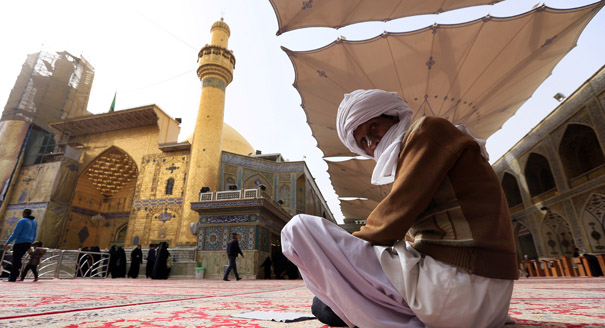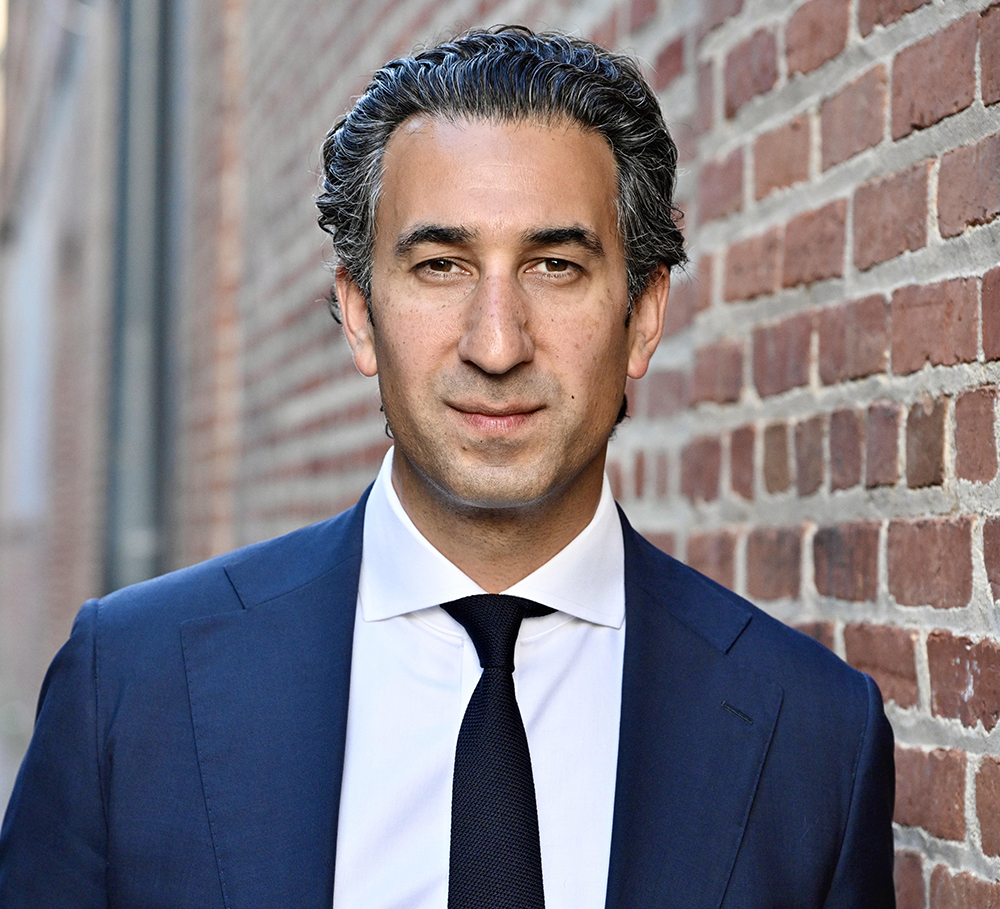The uprisings showed that foreign military intervention rarely produced democratic breakthroughs.
Amr Hamzawy, Sarah Yerkes

Source: Getty
No longer confined to homeland states, Shia politics is being advocated, reinforced, and supported by diasporic transnational networks.
After spending decades awaiting and even plotting the demise of former president Saddam Hussein, Iraq’s exiled political and religious elites swept back to their homeland in 2003 and, in many cases, to power. The return of Shia diasporic figures and parties fundamentally altered the state’s political trajectory, abruptly replacing a Sunni minority government with a Shia majority and displacing native insiders with diasporic outsiders. Notably, all of Iraq’s former prime ministers, Ibrahim Jaafari, Ayad Allawi, Nouri al-Maliki, and the current prime minister, Haider al-Abadi, are former Shia exiles.
While Abadi has appealed to cross-sectarian alliances, possibly challenging the status quo, it is hard to overstate their sectarian influence on Iraqi politics while in opposition and in the post-2003 era, as well as on the wider Shia diaspora. Indeed, understanding Iraqi politics requires examining not only domestic politics but also the transnational politics of the extraterritorial Shia population. As exiled Shia elites have shaped the politics and system of the Iraqi state, in turn, the Shia-led state has fueled and empowered Shia identity politics in the diaspora, reinforcing Shia dominance inside Iraq and shaping ethno-sectarian political movements far beyond it.
The Iraqi Shia diaspora was born of several waves of migration. The first came during the Iraq-Iran war (1980–1988), when many of Iraq’s Dawa Party members were persecuted and other Shia families were exiled for having Iranian origins—a charge the Baathist regime exploited for political ends.1 A further wave followed the Shia uprising in 1991, when thousands of Shia revolted against the regime but were later crushed by Baathist forces, leading to mass displacements and migrations abroad. This long history of Shia oppression is important for understanding the psychology of Shia politics in Iraq and consequently Iraqi politics in the post-2003 era.
Persecuted and exiled, Shia elites’ narratives on victimhood shaped the genesis of the new Iraqi state. Presenting themselves as Iraq’s long oppressed but rightful rulers, they collaborated throughout the 1990s with the U.S. and UK governments to help overthrow Saddam Hussein, providing intelligence about the Iraqi state and helping to legitimize intervention in the eyes of Western governments.2 Shia diasporic figures, including Ahmed Chalabi and Ayad Allawi, and the two important political parties of Dawa and the Supreme Council for Islamic Revolution in Iraq were thus instrumental to the U.S.-led coalition’s post-intervention plan.3 Chalabi, in particular, was successful at convincing U.S. neocons in Washington that a Shia government in Iraq would be moderate, pro-American, and pro-Israeli and would in no way be an Iranian satellite.
Tragically, the exiled Shia elites’ understanding of Iraq was driven by their claims to power and woefully outdated. With U.S. backing, they supported a power-sharing system that institutionalized ethnic and sectarian cleavages, and since the Shia parties represented the demographic majority, this system could only work in their favor. In fact, this unitary act laid the foundation for the political system in Iraq, which rapidly started to resemble the old cloth of authoritarianism. This time, however, it was tainted by ethno-sectarianism, the new order of the day.
With each political transition—from the Iraqi Governing Council (IGC) to the Transitional Administrative Law—the first wave of Shia diasporic elites (as well as the Kurdish parties) supported and often encouraged the U.S.-UK coalition’s calamitous political decisions. These included “de-Baathification” and the disbanding of the army—two policies that would forever change the course of Iraqi politics. Both policies effectively dismantled existing state institutions and human resources instead of strengthening and building on them. And with the removal of the police force came the loss of law and order that could have prevented the wide-scale looting and violence that began in 2003. More destructive still was the exclusion of thousands of Sunnis from state and society and the resulting unleashing of a resentful public, whose vengeance would later manifest in violent reprisals throughout Iraq’s 2006 civil war and the formation of the self-proclaimed Islamic State.
Corruption and cronyism also became widespread as Shia diasporic leaders recruited family and friends from their overseas networks. Politics was largely seized by a coterie of diasporic individuals as more and more political appointments were made through transnational networks, based on party membership and loyalty to political leaders rather than meritocratic or technocratic abilities. The takeover by diasporic returnees also created huge tensions between insiders who had lived through the ravages of Saddam’s regime and outsiders who were perceived as having lived comfortable lives abroad. This was further exacerbated by the fact that few appointees had political expertise, lacking the experience and skills they needed to govern let alone rebuild a country as politically complex as Iraq. Accordingly, Shia diasporic elites succumbed to the same politics of patronage that had previously blighted the country’s politics under Saddam Hussein, breeding corruption and ineptitude in a state in desperate need of talent and stability.
Consequently, and ironically, the project of building a new democratic and free Iraq commenced undemocratically. By the time Iraq’s first democratic elections took place in December 2005, Shia political leaders who came to power through the IGC and were supported by the U.S.-UK coalition had already gained a significant advantage, so it was unsurprising that the United Iraqi Alliance, an alliance of Shia political parties, dominated the elections. Iraq’s first democratically elected prime minister was Jaafari, a British Iraqi Dawa Party member. Many more Shia returnees would later assume ministerial and parliamentary positions, including Maliki, whose rule would epitomize the sectarian-diasporic dynamic. This legacy of Shia diasporic transnational networks used for recruiting political staff throughout Iraq’s political system continues to this day.
Yet, could Iraq’s experience with Shia returnees be changing with its fourth diasporic prime minister, Abadi? Recent polls and anecdotal evidence have indicated that since the liberation of Mosul and Hawija from the Islamic State, his popularity has been increasing—not only among the Shia but also among Iraq’s Sunni population. His Mosul liberation plan was carefully executed to mitigate Sunni fears, as pictures and broadcasts emerged of Sunni families liberated from Islamic State rule. Similarly, his recent takeover of Kirkuk was a shrewd and bold step for a prime minister often critiqued for his nonreactive approach. These successes bear witness to Abadi’s growing confidence and, in the minds of many Iraqis, his ability to safeguard Iraq’s sovereignty. Furthermore, he has been at least outwardly attempting to shift Iraq’s sectarian political mentality. From within the diaspora, anecdotal evidence suggests he has appealed to a younger generation of politically minded Iraqis, seeking out those with expertise and skills rather than those who are connected to his networks. His latest endeavor in Baghdad has also sought to penalize anyone promoting sectarian hate speech by fining and even arresting those who are found guilty. However, it remains to be seen whether these political gains and elementary steps toward combating a sectarian mind-set in Iraqi society will be used to evoke a new dawn for Iraqi politics, or are simply political gains and half measures timed astutely ahead of Iraq’s approaching national elections in May 2018.
Since 2003, Shia diasporic opposition parties and figures have had an indelible impact on the direction of Iraqi politics and the Shia-controlled Iraqi state. Correspondingly, the impact of Shia ascendency and sectarian politics on the wider diaspora has also been significant. A Shia political identity has emerged and strengthened, consolidating Shia political power in Baghdad.
Of course, there is no such thing as a homogeneous Shia diaspora; as with any community, there are multiple layers of categorical difference and division. While in the pre-2003 era the Shia diaspora may have been united in their political stance against Saddam Hussein’s tyranny, in the post-2003 era, Iraqi Shia politics has been divided along clerical and political lines, echoing the situation in Iraq and the new power brokers ruling the country.
Broadly speaking, the silent majority within the Shia Iraqi diaspora back the marja or clerical authority of Grand Ayatollah Ali al-Sistani, whose political influence and opinion, albeit indirect, holds immense sway. Others, meanwhile, follow the Iranian clerical authority of Grand Ayatollah Ali Hosseini Khamenei or the clerical authority of former Grand Ayatollah Mohammed Shirazi. Each school of thought is underpinned by specific rituals and practices, such as those associated with the holy month of Muharram and specifically the performative act of Tatbir (the manner in which Shia mourn the killing of Imam Hussein), which serve to differentiate but also divide the Shia population.
The Iraqi Shia diaspora is also split politically between those who support the historical Dawa Party, with some loyal to Maliki, and those faithful to Abadi. Meanwhile others support the Islamic Supreme Council of Iraq (ISCI) or the Sadrist Movement, led by the Iraqi Shia cleric Moqtada al-Sadr. Clerical authorities and political parties also intersect, with the ISCI historically linked to Iran and Dawa famously distancing itself from Iranian theocracy and influence under Abadi, though previously close to Iran under Maliki. More recently, Sadr has mobilized, alongside civil society groups, against the corruption and authoritarianism of the Shia-led government. A tangled web of religious and political loyalties has supplanted the idea of a united, homogeneous group.
The divisions in Iraq that are reflected in the diaspora are particularly evident during elections, when members of the diaspora have the opportunity to support their political parties through extraterritorial voting. With a large Iraqi Shia diaspora scattered all around the world, it remains a powerful constituency. While there are no exact figures for Iraqis residing in the diaspora, there are currently millions of Iraqis in neighboring countries such as Egypt, Jordan, Lebanon, Iran, and Syria, as well as hundreds of thousands living in Western host lands, primarily in Sweden, the United Kingdom, and the United States.
Yet despite the clerical and political divisions that exist among the Iraqi Shia diaspora, and their criticism of and disappointment with the Shia diasporic elites they supported back in 2003, voters still back Shia political parties. As one Shia individual explained to this author in London, a fear and “phobia” still looms large that the Baath Party will return, which engenders a fear of the sectarian “Other.” This reality underlines the invasive psychology of sectarian politics in Iraq, which is echoed in the diaspora. For as long as this persists, Shia voters will maintain a positive feedback loop that continually nurtures the dominance of Shia political power in Baghdad.
This mutual reinforcement has only been magnified with the rise of the Islamic State and its deliberate targeting of Shia individuals—best exemplified by the Camp Speicher massacre, where more than 1,700 Shia soldiers were killed. For many Shia, both inside and outside Iraq, and especially since the fall of Mosul in 2014, the Islamic State has posed an existential threat. This new threat against Shias has revived narratives of victimhood prevalent in Shia mythology and history. The narratives date back to the decision by the shura to make Abu Bakr successor to the Prophet Muhammad, instead of Imam Ali, seen by the Shia as his true and legitimate heir; the betrayal of Muawiya, the Ummayyad Caliph who announced Yazid I as his successor instead of Imam Hussein; and the murder of Imam Hussein in the Battle of Karbala in 680 AD. These significant events laid the foundations of the Shia-Sunni split. Consequently, enduring Shia oppression during the Ottoman Empire—a divide-and-rule British mandate that would indelibly shape Iraqi politics in favor of the Sunni minority at the expense of the Shia majority—and decades of persecutions under Saddam Hussein’s rule have fuelled the collective memory of Shia victimhood and fortified the Shia community.
This dynamic is most evident during the holy month of Muharram. In London, where a large and established Shia Iraqi community has resided since the 1980s, thousands march annually in a procession starting in Marble Arch and ending in Trafalgar Square. In 2004, the BBC reported, “The march had no outward political messages, there were no placards about the war in Iraq and the marchers seemed focused purely on the religious significance of what they call the tragedy of Karbala.” Yet, since the rise of the Islamic State in 2014, the processions have become increasingly politicized, as Shias in the diaspora have used the event as an antiterrorist platform, linking the killing of Imam Hussein to the current killing of Shia in Iraq, as well as using Imam Hussein’s message against tyranny and terrorism to dispel the idea of the Islamic State representing Islam. Slogans and banners carrying messages, including “Hussain stood against the terrorists of his time” and “Hussain stood for freedom,” are carried alongside other banners reading “ISIS [the Islamic State] is the enemy of Islam.”
The binding of politics, religion, and historical narratives of victimhood underlines a growing trend in the politicization of Shia Islam, utilized to mobilize support amid sectarian battles waged across the region and to demarcate their version of Islam. The Shia political identity of the diaspora has thus emerged from an expression of Shia pride, the combating of misconceptions about the Shia faith, and the insistence that Islam is not represented by the Islamic State—thereby distancing the Shia faith from terrorism.
When Grand Ayatollah Ali al-Sistani issued a fatwa (ruling) for Shia to mobilize against the Islamic State in 2014—calling citizens to defend the country, its people, and its sacred places—the immediate response was that tens of thousands volunteered to join the Iraqi Security Forces. Young Shia men in the diaspora also mobilized, even though those residing abroad were urged to refrain from doing so. In addition, support has catapulted on social media platforms, such as Twitter, for the Iraqi security forces, the Shia-led Popular Mobilization Forces, and the commander in chief, Abadi, especially as Islamic State strongholds are defeated. Twitter has become a new transnational channel for the diaspora to connect to Iraqi politics and assert their Shia faith.
Another notable event is the pilgrimage of Arbaeen, which commemorates the last day of mourning for the death of the Prophet Muhammad’s grandson, Imam Hussein.4 The threat from the Islamic State has resulted in a spike in the numbers of Iraqi Shia in the diaspora making the pilgrimage. Furthermore, in the last few years, the pilgrimage has taken on a political dimension, as the very act of making the trip to Iraq, and to the holy city of Karbala, is an act of defiance and a way of asserting a Shia identity. Despite the fact that the Islamic State has used the pilgrimage as an opportunity to attack Shia Muslims whom it views as apostates, 22 million visitors made their way to Karbala in 2015, making it one of the biggest religious festivals in the world. Most strikingly, a large second-generation contingency from within the Shia diaspora also participate in these visits, demonstrating the intensity and rise of a Shia political identity that has transcended both the boundaries of the Iraqi state and generations of Iraqis.
The role of Shia diasporic elites in shaping the Iraqi state in 2003, in collaboration with the U.S.-UK coalition, is hard to overstate. Shia diaspora returnees agreed to, along with the Kurdish parties, an ethno-sectarian power-sharing system that has provoked deep schisms in Iraqi politics and society. While diasporic interventions can play a significant role in supporting livelihoods, transferring knowledge, and providing human resources in times of brain drain, during political transitions, they should be approached with caution. Western governments should heed the lessons of Iraq, as they demonstrate the perils of parachuting long-exiled elites, who lack legitimacy, to positions of power without understanding their histories, motivations, agendas, and the populations they purportedly represent. One consequence has been an inability to extricate the Iraqi state from Shia political cronyism and relationships of patronage—this time bolstered by diasporic transnational networks.5 These networks still play a role today, as diasporic returnees in power still rely on them for political appointments, political counsel, and lobbying in Western host lands.
Ethno-sectarianism has subsequently infiltrated the diaspora and given rise to a Shia political identity, which has at best sat alongside an Iraqi national identity and at worst superseded it. For example, Iraqi elections have consistently favored Shia political parties irrespective of the disenchantment and exasperation felt by many amid Iraq’s Shia diaspora. Shia diaspora members are also more likely to mobilize in response to a call from their chosen Shia marja or a perceived attack on their Shia faith than to a call from elected Iraqi politicians. Transnational Shia networks are mutually reinforcing—as Shiism in Iraq emboldens Shia identity in the diaspora, the Shia diaspora increasingly act as bastions of Shiism in the West, operating as a transnational civil society that mobilizes in response to cultural and political events inside Iraq.
The ascent of the Islamic State and attacks on Shia communities in Iraq have also galvanized Shia political identity and once more united the disparate Shia diaspora populations around a common enemy. However, now that Iraq’s security forces are curtailing the Islamic State’s advancement and have liberated key Iraqi cities, how will this affect Shia factions in Iraq and their supporters in the diaspora? Certainly, Shia political power shows no signs of abating in Iraq, but will Abadi’s successes against terrorism translate into more support from within his party or the various Shia political factions? Will they translate into an easy victory in the upcoming elections and a maintenance of the status quo? Or will Abadi be brave enough to seize this opportunity to break away from sectarian cleavages and appeal to cross-sectarian alliances, departing from an exclusively Shia-dominated Iraqi nationalism?
A particular beacon of optimism is the younger generation of extraterritorial Iraqi Shias that continue to connect with Iraq. A professional, educated, and westernized Shia Iraqi diaspora is emerging, maintaining links with Iraq through social media platforms, pilgrimages, and the creation of new Shia practices and rituals.6 How will a generation of westernized Iraqi Shias influence Iraqi politics? Could their experiences of democracy be the answer to Iraq’s rampant culture of corruption and patronage? Will they continue to mobilize as Shia or will they draw a line between religion and the state?
With the revival of Shiism both within Iraq and in the world more generally, Iraqi Shia diaspora politics and Shia diaspora politics at large is worth paying close attention to. No longer confined to homeland states, Shia politics is also being advocated, reinforced, and supported by diasporic transnational networks. The Iraqi case represents a wider trend in the role of diaspora politics in shaping the politics of countries of origin. Indeed, as conflicts in Iraq, Syria, and Yemen continue to arise and threats against Shia communities in Bahrain, Pakistan, and Saudi Arabia increase, new refugees will emerge in neighboring states and in Western host lands. The Shia diaspora will likely enlarge and new transnational connections will transpire, thus further shaping the politics of their homeland countries and the wider region as a whole.
Oula Kadhum specializes in Middle Eastern politics, with a focus on the diaspora. Her PhD thesis explored the Iraqi diaspora's contributions toward state building in Iraq following the 2003 U.S.-led intervention.
1 A status that harks back to the Ottoman period, often used to evade extended military service by declaring Persian descent. In the 1920s, Iraq maintained this system and people were either registered as having tabaiya Othmaniya (Ottoman origins) or tabaiya Faresiya (Iranian origins). See Ali Babakhan, “The Deportation of Shi’is During the Iran-Iraq War: Causes and Consequences,” in Ayatollahs, Sufis and Ideologues: State, Religion and Social Movements in Iraq, edited by Faleh Abdul-Jabar (London: Saqi Books, 2002), 183–210.
2Author interview with UK official, 2015.
3In 2003, the council was renamed the Islamic Supreme Council of Iraq (ISCI).
4Arbaeen means forty, referring to the fortieth day of Ashura, the commemoration of the martyrdom of Imam Hussein.
5Fanar Haddad, “Shia-Centric State Building and Sunni Rejection in Post-2003 Iraq,” Carnegie Endowment for International Peace, January 7, 2006.
6See, for instance, Emanuelle Degli Esposti, “The Aesthetics of Ritual—Contested Identities and Conflicting Performances in the Iraqi Shi’a Diaspora: Ritual, Performance and Identity Change,” Politics 38, no. 1 (2018); and Yafa Shanneik, “Shia Marriage Practices: Karbala as lieux de mémoire in London,” Social Sciences 6, no. 3 (2017): 100.
Carnegie does not take institutional positions on public policy issues; the views represented herein are those of the author(s) and do not necessarily reflect the views of Carnegie, its staff, or its trustees.
The uprisings showed that foreign military intervention rarely produced democratic breakthroughs.


Amr Hamzawy, Sarah Yerkes
Is Morocco’s migration policy protecting Sub-Saharan African migrants or managing them for political and security ends? This article unpacks the gaps, the risks, and the paths toward real rights-based integration.
Soufiane Elgoumri
A recent offensive by Damascus and the Kurds’ abandonment by Arab allies have left a sense of betrayal.
Wladimir van Wilgenburg
A conversation with Karim Sadjadpour and Robin Wright about the recent protests and where the Islamic Republic might go from here.



Aaron David Miller, Karim Sadjadpour, Robin Wright
Fifteen years after the Arab uprisings, a new generation is mobilizing behind an inclusive growth model, and has the technical savvy to lead an economic transformation that works for all.

Jihad Azour